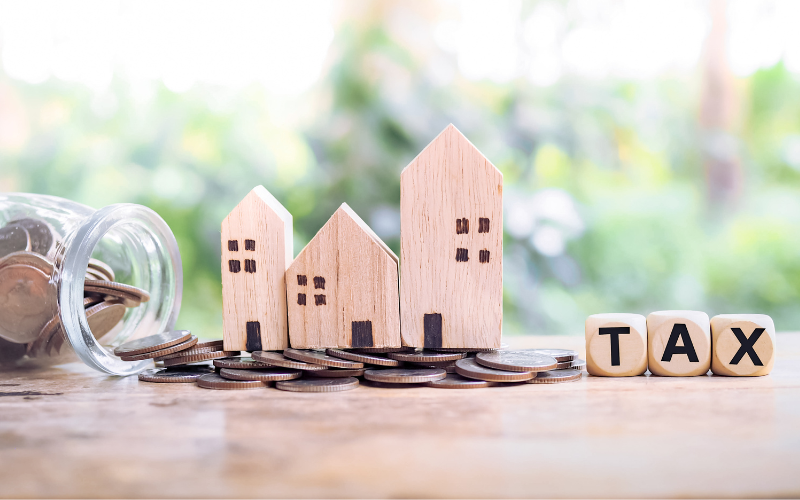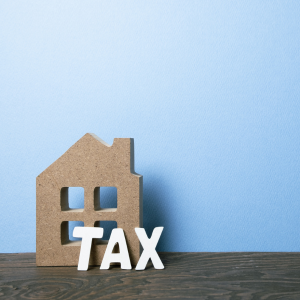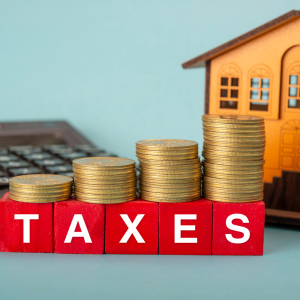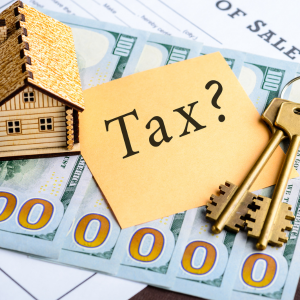
Tax Implications of Real Estate Transactions in Greenville, North Carolina
People who own homes in Greenville, North Carolina, need to know how the tax system works before they sell their homes. In Greenville, as in the rest of North Carolina, people who sell land that has increased in value since they bought it may have to pay capital gains tax.
The gain is found by taking the sale price and subtracting the home’s original purchase price plus any qualifying changes. Some exemptions may help homeowners. For example, the primary residence exclusion lets individuals exclude up to $250,000 of profit ($500,000 for married couples filing jointly) if they stayed in the home for at least two of the last five years before selling it.
Sellers also need to consider state taxes. North Carolina does not have a special transfer tax on real estate sales like some other states do, but it does have an excise tax on property transfers that is $1 for every $500 of the property’s value. Knowing these details can help sellers in Greenville better handle their financial responsibilities during a real estate transaction.
Understanding Capital Gains Tax When Selling a Home in Greenville, NC
If Greenville, NC, residents want to make the most money when they sell their homes, they need to know about the capital gains tax. When you sell your home for more than you paid, making a profit or “gain,” you must pay capital gains tax. In Greenville, this tax is mostly based on how long the homeowner has owned the home and whether it was their main home.
If you owned and stayed in your Greenville home for at least two of the five years before you sold it, you may be able to get a tax break that lets single people avoid paying up to $250,000 in gains and lets married couples file jointly avoid paying up to $500,000. You should know that this exclusion only works if certain conditions are met, like not having claimed another exclusion on a different home in the last two years.
Knowing how changes you make to a property while you own it affect its cost base can also help you figure out your taxable gains. Working with a real estate agent and a tax expert who are both familiar with North Carolina’s rules can help you get through these complicated steps and could even lower your overall tax bill when you sell your Greenville home.
Essential Steps for Calculating Property Sale Taxes in Greenville, NC
You need to know about home sale taxes in Greenville, NC, if you want to sell your house. To begin, learn how to submit your tax return for stock gains. This is based on how much money you got when you sold your house.
To find out how much the house costs, add the cost to fix it or make large changes. People who have lived in their Greenville home for at least two of the five years before they sell it may be able to get tax breaks.
This means that the tax you pay can change a lot. Besides that, you should think about the North Carolina-only rules and how they might change the taxes you have to pay.
The rules in your state will tell you what credits and other benefits you can get. A real estate tax expert in your area can help you figure this out. Also, remember that Pitt County may charge you fees or transfer taxes when you buy something.
If people in Greenville know these steps, they can ensure they follow the tax laws in their area and get the best deal possible when they buy something. For more guidance or to discuss your options, contact us today, and our team will be glad to help.
How to Qualify for Tax Exemptions on Home Sales in Greenville, NC

Finding out how to get tax breaks on home sales in Greenville, NC, can have a big effect on your finances when you sell your house. People who own their own homes may get the capital gains tax exclusion, which lets them keep up to $250,000 of their profit out of their taxed income. Married couples filing jointly can keep up to $500,000.
To get this deduction, the home had to have been the main residence for at least two of the five years before it was sold. Also, the homeowner hasn’t used this restriction on another property in the last two years.
By meeting these requirements, many buyers will be able to save a lot of money on taxes when they buy or sell a home in Greenville. Sellers need to keep correct records and talk to a tax professional to ensure they’re following IRS rules and getting the most out of tax breaks.
A Detailed Guide to Filing Taxes After Selling Your House in Greenville, NC
If you’re selling a house in Greenville, NC, you must know a lot about real estate taxes to file your taxes properly. First, you need to check to see if there are any capital gains tax breaks available for the sale of your house.
If you’ve stayed in your Greenville home for at least two of the last five years, you can avoid paying capital gains tax on up to $250,000 of your profit if you’re single and up to $500,000 if you’re married and filing jointly. Keep careful records of how much you paid for your home and any big changes you’ve made. These can change your adjusted cost base, changing your taxable gain.
Also, consider the tax effects unique to your state by looking at North Carolina’s tax rules and how they apply to real estate deals. It’s also important to know about local property taxes. For example, to find out when and how much Greenville’s property taxes are due, check out their website.
Talking to a tax expert who knows about real estate in North Carolina can give you good advice and help you get through any problems that might come up when you try to sell a home in this area.
Key Tax Deductions for Home Sellers in Greenville, North Carolina
If you’re selling a house in Greenville, North Carolina, knowing about certain tax breaks can have a big effect on your money. There are a number of tax breaks available to people who sell their home in Greenville. One of these is the capital gains tax exclusion, which lets you keep up to $250,000 of the profit from the sale if you’re single and $500,000 if you’re married and filing jointly, as long as you’ve lived in the home for at least two of the last five years.
You can also take deductions from your taxed income for costs directly related to selling your home. Some examples are real estate agent profits, legal fees, and the cost of advertising.
Costs for home improvements made within 90 days of closing may also be tax-deductible if they were done to raise the home’s value before it was sold. By learning about these discounts and talking to a tax expert who knows the Greenville real estate market, you can make sure you’re following the rules and get the most money out of selling your home.
Comparing Federal and State Taxes on Real Estate Sales in Greenville, NC
Homeowners in Greenville, NC, need to know the differences between federal and state real estate taxes to sell their house. When you sell land at the federal level, capital gains tax is one of the most important things to consider. If you’ve stayed in your Greenville home for at least two of the last five years, you may be able to get a tax break on your capital gains. For single filers, this can be up to $250,000, and for married couples filing jointly, it can be up to $500,000. This limit can have a big effect on how much of the sale’s income you have to pay taxes on. North Carolina, on the other hand, does not have an extra state-level capital gains tax. However, buyers do have to pay a transfer tax when the deal is closed. This property transfer tax is based on a rate in Pitt County, home to Greenville.
2% of the house’s price. Sellers should also know about any local property taxes that might be due until the close. By knowing about these different duties, Greenville home sellers can ensure they can handle both federal and state real estate taxes correctly when they sell their house.
Navigating the 1031 Exchange When Selling Property in Greenville, NC
If you want to avoid paying capital gains taxes when you sell a home in Greenville, NC, you may need to know about the 1031 swap. A 1031 swap, named after Section 1031 of the Internal Revenue Code, lets people who own investment real estate sell it and then buy another property of the same type with the money they get without paying federal capital gains tax on the first sale.
Real estate investors who want to improve or diversify their portfolios without losing equity to taxes will benefit the most from this tax-deferral plan. In Greenville’s fast-paced real estate market, using a 1031 exchange requires careful planning and strict IRS rules. For example, you must find a replacement property within 45 days and complete the buy within 180 days of selling the property you are giving up.
Investors also need to ensure that the properties are “like-kind” according to IRS rules. This usually means that they are held for business or investment reasons. By understanding these rules well, Greenville sellers can carefully delay big tax bills while maximizing their real estate investments.
Common Mistakes to Avoid When Paying Taxes on Home Sales in Greenville, NC

When you’re getting ready to sell your Greenville, NC, house faster, it’s smart to know about the property taxes. Often, people don’t think about the capital gains tax, which can have a big impact on their finances.
People who own their own homes often forget how important it is to get their adjusted base right. Their tax bill might go up if they don’t list costs like moving or ending costs. It’s also a mistake not to know how the main home exclusion works. If you meet certain residency standards, this can save you a lot of money on taxes.
Also, people who sell something and then spend the money might forget to file their taxes, which could have tax consequences they didn’t expect. Many homeowners also don’t talk to a trained tax expert who knows the Greenville, NC, state and federal tax rules. In this case, they lose out on important tax breaks or deductions.
Estimating state and local transfer taxes properly is another area where people often go wrong, which can add to their financial stress. When people in Greenville, NC, sell their homes, they can better handle the complicated world of real estate taxes if they know about these common mistakes and get the right help.
How Closing Costs Affect Your Tax Liability When Selling a House in Greenville, NC
In Greenville, NC, it’s important to know how the closing costs affect your taxes when you sell your home. Real estate agent commissions, title insurance, and attorney fees are some of the fees that make up closing costs. All of these can have a big impact on your funds.
If you sell your home for cash in Winterville, NC, and then have to pay capital gains tax, you can often take these costs away from the total sales price. The IRS lets you figure out how much money you made or lost by taking some closing costs out of the price you got for the house.
One example is if you fixed up or changed a lot about the house before selling it. You could use the money you spent on those things to lower your taxed gains. These prices affect how much capital gains tax you may have to pay, so it’s important to keep good records of them.
In the Greenville, NC real estate market, learning about these tax breaks can help you get the most money when you sell your home and pay less in taxes overall.
Strategies for Reducing Tax Burden on Real Estate Profits in Greenville, NC
When you sell a house in Greenville, NC, there are a few things you can do to reduce your tax bill. You can save money by not having to pay capital gains tax. It lets residents deduct up to $250,000 in profit if they are filing as a single person or up to $500,000 if they are married and filing jointly, as long as they have lived in the home as their main home for at least two of the last five years.
People who own homes can also consider selling them when they make less money. They might be able to pay less in taxes and capital gains taxes as a result. Making changes to your home before you sell it can also be helpful, since the costs of these changes may raise the property’s cost base and lower its taxed gains.
When sellers make changes, they should write down everything they do and how much it costs. Working with a real estate agent or tax expert who knows North Carolina laws can help you find more ways to save on taxes and give you good information specific to Greenville’s housing market.
Do I Pay Taxes When I Sell My House in North Carolina?
When people in Greenville, NC, sell their homes, they need to know how their taxes will change. The value of a North Carolina home may be taxed if the owner sells it after it has increased in worth.
On the other hand, there are tax breaks and exemptions that can help lower or even eliminate this tax. When it comes to capital gains, the IRS has a main home exclusion that lets people who meet certain ownership and location requirements keep up to $250,000 ($500,000 for married couples) of their gains after taxes.
When you buy or sell a house in North Carolina, you may also have to pay an income tax. Many times, this tax is $1 for every $500 that the house sells for. When you sell your home, you must ensure you follow all federal and state rules. You can get help by talking to a real estate agent or tax expert in Greenville.
If you know about these property tax parts, you can handle any bills and make smart financial plans when you sell your Greenville, NC home. If you’d like an easier way to sell without the stress of taxes or repairs, Helping Home Solutions can help by offering a fair cash deal for your property.
How to Avoid NC Capital Gains Tax on Real Estate?

If people in Greenville, NC, do a few things, they won’t have to pay the North Carolina capital gains tax on their home when they sell it. One great way to do this is to keep your main home’s tax rate low. If you file as a single person, you can hold back up to $250,000 in capital gains. If you file as a married couple, you can hold back up to $500,000. They can hold back up to $1 million if they are married and file equally.
You have to have lived in the house as your main home for at least two of the five years before you sell it. With a 1031 swap, you can use the money from the sale of one property to buy a similar property. You might not have to pay capital gains taxes immediately if you do this.
Also, write down everything you change about your home over time. Your tax bill will go down if you add the costs of these changes to the home’s base value. Someone who knows a lot about taxes and North Carolina real estate taxes can give you information specific to your case.
You can pay less or no capital gains tax if you sell your Greenville home with good planning and take advantage of tax breaks and extensions.
Who Pays Real Estate Transfer Tax in NC?
In North Carolina, including Greenville, the seller is usually the one who has to pay the real estate transfer tax. The sale price of the land is used to figure out this tax, which is also known as an “excise tax” or “deed transfer tax.”
In North Carolina, the usual rate is $1 for every $500 of the property’s value. For example, if you sell a house in Greenville for $250,000, you will have to pay $500 in real estate transfer taxes. It is important to remember, though, that this tax is usually paid by the seller. However, if both the buyer and the seller agree during talks, they can split the cost.
When you sell your home in Greenville, NC, you need to know about these factors because they affect your closing costs and the amount of money you get. When you sell your home, you should always talk to a local real estate agent or lawyer who knows the Greenville market to make sure you’re following all the rules when it comes to real estate taxes.
Do You Have to Report a Sale of a Home on a Tax Return?
It’s important to know what the real estate taxes will be like and if you need to report the sale on your tax return before you sell your Greenville, NC home. Most of the time, residents who make a taxable gain must report the sale of their home on their federal tax return.
The Internal Revenue Service (IRS) says you have to compare the sale price to your cost basis, which is the price you paid for the house the first time plus any changes you made over time. But many homes can get the Home Sale Exclusion under IRS Section 121. This lets you avoid up to $250,000 of gain if you’re single or $500,000 if you’re married and filing jointly, as long as you meet certain tests of ownership and use.
One of these conditions is that you must have owned and lived in the home as your main residence for at least two of the five years before the sale. If these conditions aren’t met, you must file a report and may have to pay capital gains taxes.
Also, your state may have different real estate tax rules, so talking to a local tax expert in Greenville can help you make sure you follow both federal and North Carolina state tax laws when you sell your house. Understanding these rules is important to get the best financial result when you sell your home.
Are you thinking about selling? Helping Home Solutions helps you sell fast, avoid repairs, and enjoy a hassle-free sale. We make fair cash offers and take care of the details. Call (252) 541-7149 for a no-obligation offer and start today.
Helpful Greenville Blog Articles
- Selling Your Inherited House In Greenville, NC
- Selling A Fixer-upper In Greenville, NC
- Sell Your Greenville, NC, Home Fast Despite Water Damage
- Taxes When Selling A Home In Greenville, NC
- Tenant Property Damage: Essential Guidelines For Greenville, NC Landlords
- Sell A House With A Lien In Greenville, NC
- Sell A Mortgaged House In Greenville, NC
- Selling A Mold-Affected Home In Greenville, NC
- Guide To Filing A Quitclaim Deed In Greenville, NC
- Selling Your House In Greenville, NC And Relocating Out Of State

| LEVIED | TAXED | HOME INSURANCE | VEHICLES | BIDDER | GREENVILLE CITY LIMITS |
| MOBILE HOME | PROPERTY VALUES | VALUATION | APPRAISALS | HOMELIGHT | PAYMENTS |
| INTEREST | LIENS | AUCTIONED | AUCTIONEERS | AUCTION | |
| ASSETS | RECEIPT | REALTORS | LICENSE | FINANCIAL INVESTMENTS | TELEPHONE |
| ASSESSOR | TAX ASSESSOR | MONEY | LEASED | LESSEE | GREENVILLE COUNTY |
| REAL PROPERTY | PROPERTY OWNERSHIP | LEGALLY RESPONSIBLE | INFORMATION | CAPITAL ASSET | BUDGET |
| BILL OF SALE | PAPER | HOMEOWNERSHIP | NONPROFIT | NON-PROFITS | MARKET VALUE |
| INFRASTRUCTURE | FORECLOSURE | TAX YEAR | DRIVER LICENSE | DRIVERS LICENSE | DATA |
| COMPANY | COMMUNITY | CASH | HOME IN NORTH CAROLINA | IN NORTH CAROLINA THE |
